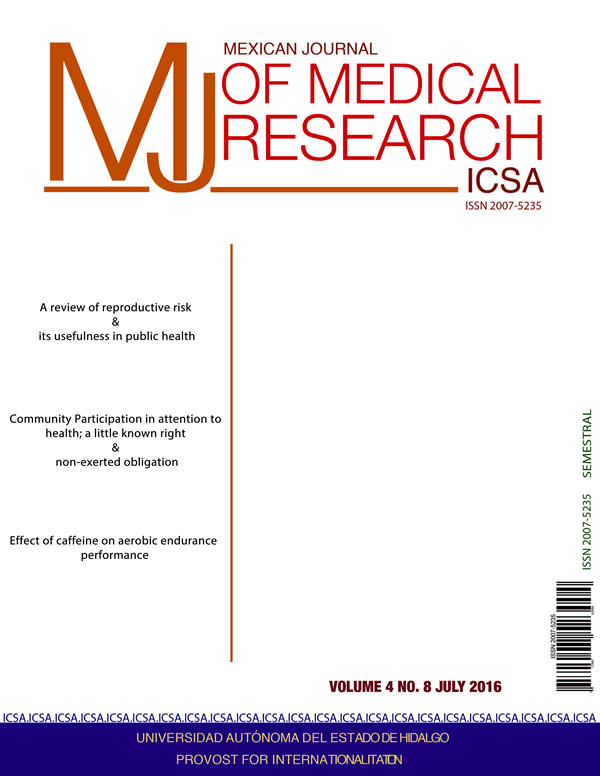Effect of caffeine on aerobic endurance performance
DOI:
https://doi.org/10.29057/mjmr.v4i8.1858Keywords:
Caffeine; Footballers athletes; Aerobic enduranceAbstract
Supplementation in sport has become very important. The athlete uses ergogenic products or supplements such as caffeine, seeking to improve performance in sports. Therefore, the main objective of this study was to determine the effect of caffeine on aerobic endurance in Mexican professional soccer players. A longitudinal, experimental and prospective, crossover, double-blind, placebo-controlled study was conducted. Aerobic resistance was evaluated with the Yo-Yo Intermittent Recovery Test. Sixteen athletes were included, who were applied the Yo-Yo test before the administration of caffeine. With a crossover design, athletes received caffeine or placebo and the Yo-Yo test was applied. The initial heart rate (HR) of the athletes was 11.7 ± 93.2 (caffeine) and 94.4 ± 21.7 (placebo) (P = 0.85). The final HRs were of 175.8 ± 18.1 (caffeine) and 181.9 ± 13.0 (placebo) (P = 0.28). The HRs recovery were 141.4 ± 22.0 (caffeine) and 142.3 ± 24.4 (placebo) (P = 0.92) and a recovery rate of 34.4 ± 12.5 (caffeine) and 39.6 ± 19.3 (placebo) (P = 0.37). With a total of 2532.5 ± 267.6 meters traveled (caffeine) and 2622.5 ± 285.5 meters (placebo) (P = 0.36). Through the analysis of results, it is concluded that for this sample of athletes, caffeine supplementation had no positive influence on aerobic endurance.
Downloads
Publication Facts
Reviewer profiles N/A
Author statements
- Academic society
- N/A
- Publisher
- Universidad Autónoma del Estado de Hidalgo
References
2. Pardo R, Alvarez Y, Barral D, Farré M. Cafeína: Un nutriente, un fármaco, o una droga de abuso. Adicciones. 2007; 19: 3.
3. Pérez A. Ayudas Ergogénicas en el Deporte. Ed. Paidotribo. Barcelona. 2009.
4. Katch V, McArdle W, Katch F. Essential of Exercise Physiology. (Ed. 4). Editorial Lippincott Williams & Wilkins, A Wolters Kluwer business. Philadelphia. 2011.
5. Foskett A, Ali A, Gant N. Caffeine enhances cognitive function and skill performance during simulated soccer activity. Int J Nutr Exerc Metab. 2009; 19: 410-23.
6. Bangsbo J. Entrenamiento en la Condición Física en el Futbol. Ed. Paidotribo. Barcelona, España. 1997.
7. Martí C, González E, Aguilar ME, Fernández R, Albendín L, Cañadas GA. La cafeína en el ámbito deportivo. Caffeine in sport. Revista-Scientla. 1989; I6: 17-25.
8. Pettersen SA, Krustrup P, Bendiksen M, Randers MB, Brito J, Bangsbo J, Jin Y, Mohr M. Caffeine supplementation does not affect match activities and fatigue resistance during match play in young football players. J Sports Sci. 2014; 32: 1958-1965.
9. Graham TE, Spriet L. Cafeína y rendimiento en el ejercicio. Sports Science Exchange. 1996; 9: 1-5.
10. Greer F, McLean C, Graham TE. Caffeine, performance, and metabolism during repeated wingate exercise tests. J Appl Physiol. 1998; 85: 1502-8.
11. Wilcox AR. Caffeine and endurance performance. Sports Science Exchange 1990; 3: 1–5.
12. Conlee RK. Amphetamine, caffeine and cocaine. Eds. Lamb and Williams MH. Perspectives in Exercise Science and Sports Medicine. Indianapolis. 1991.
13. Gant N, Ali A, Foskett A. The influence of caffeine and carbohydrate coingestion on simulated soccer performance. Int J Sport Nutr Exerc Metab. 2010; 20: 191-7.
14. Del Coso JD. Prevalence of caffeine use in elite athletes following its removal from the World Anti-Doping Agency list of banned substances. Appl Physiol Nutr. Metab. . 2011; 36: 555-61.
15. Peniche C, Boullosa B. Nutrición Aplicada al Deporte. Ed. Mc Graw Hill. México, DF. 2011
16. Caviglia E. Efectos de la ingesta de cafeína en el rendimiento de jugadores de Fútbol. Universidad Abierta Interamericana. 2010. Pp. 30.
17. Ivy JL, Costill DL, Fink WJ, Lower RW. Influence of caffeine and carbohydrate feedings on endurance performance. Med Sci Sports. 1979; 11: 6-11.
18. García M, González E, Aguilar ME, Fernández R, Albendín L, Cañadas GA. Scientia 1989; 16: 17-25.






















